The Great Divide
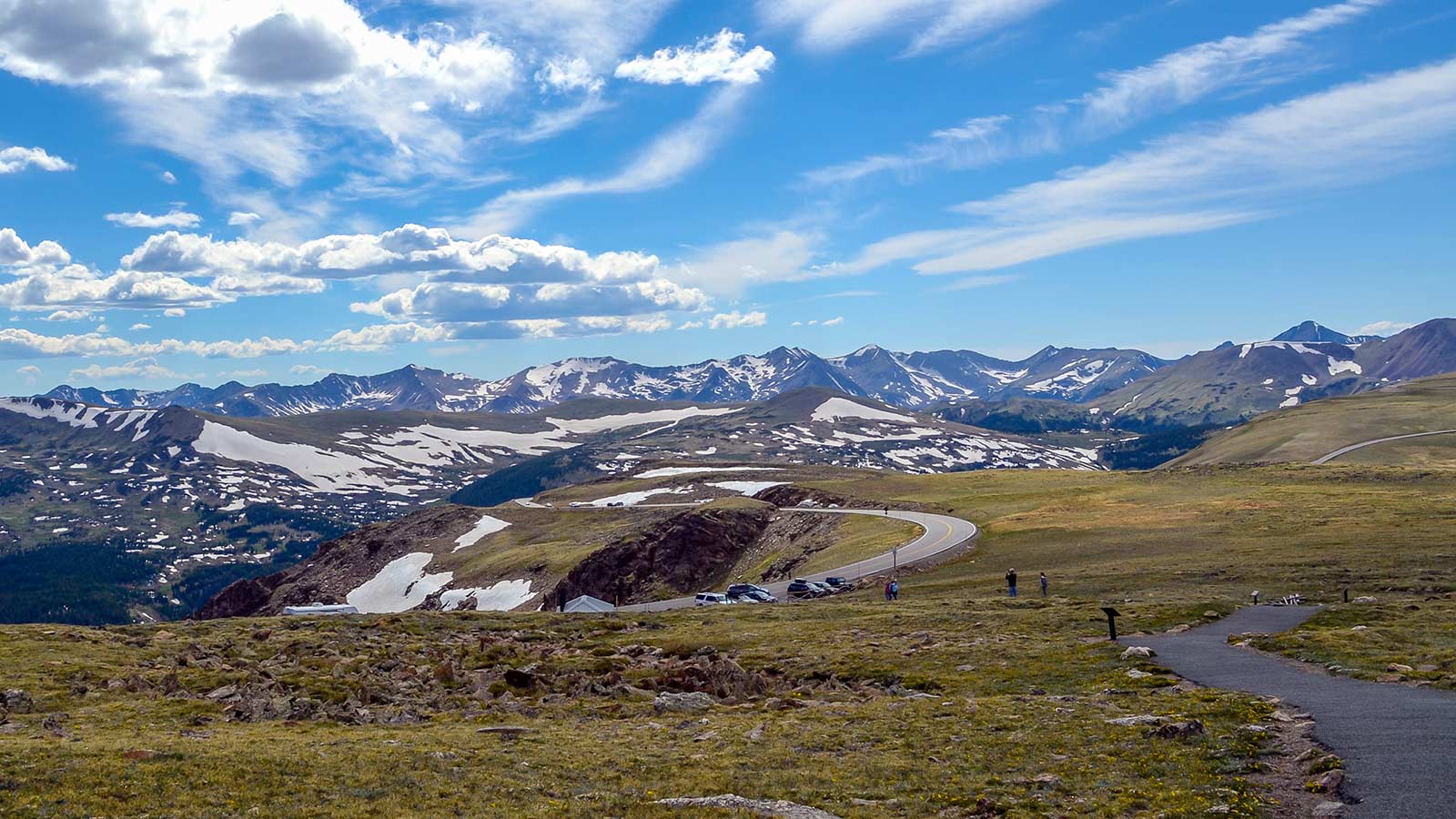
“Dreams of mountains as in their sleep, they brood on things eternal.” – C. A. Higgins, “The Titan of Chasms”
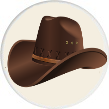
The first time I saw the Rocky Mountains up close I was sticking my head over the cab of a pickup truck as the driver approached Estes Park. I had been hitchhiking across the Western Plains and came down from Nebraska earlier that day. Our appearance was probably on the edge of being pitiful or even disturbing because the man behind the wheel of the pickup was traveling alone and he motioned for us to get in the bed in back.
He was in an old, blue Ford pickup, which seemed surprisingly smooth and sleek to a tired hitchhiker. I contemplated what it might be like to own such a wondrous vehicle with its discolored bondo patches and wheel well fenders and wooden planks lining the cargo bed. I was beginning my university education and was wishing for things we did not have when I was growing up, but I mostly dreamed of experiences.
My friend Butch and I got dropped off at the entrance of Rocky Mountain National Park. We walked up the road for a long time until we reached the entrance for Endovalley Campground and hiked toward a tent spot on the Fall River coming down from the Continental Divide. The road along the water course was still dirt in those days and had been built by the same convict crew of workers that had constructed Highway 34 about 75 years earlier over the mountain passes to Grand Lake. Elk were grazing in a meadow below us as we turned off the paved road.
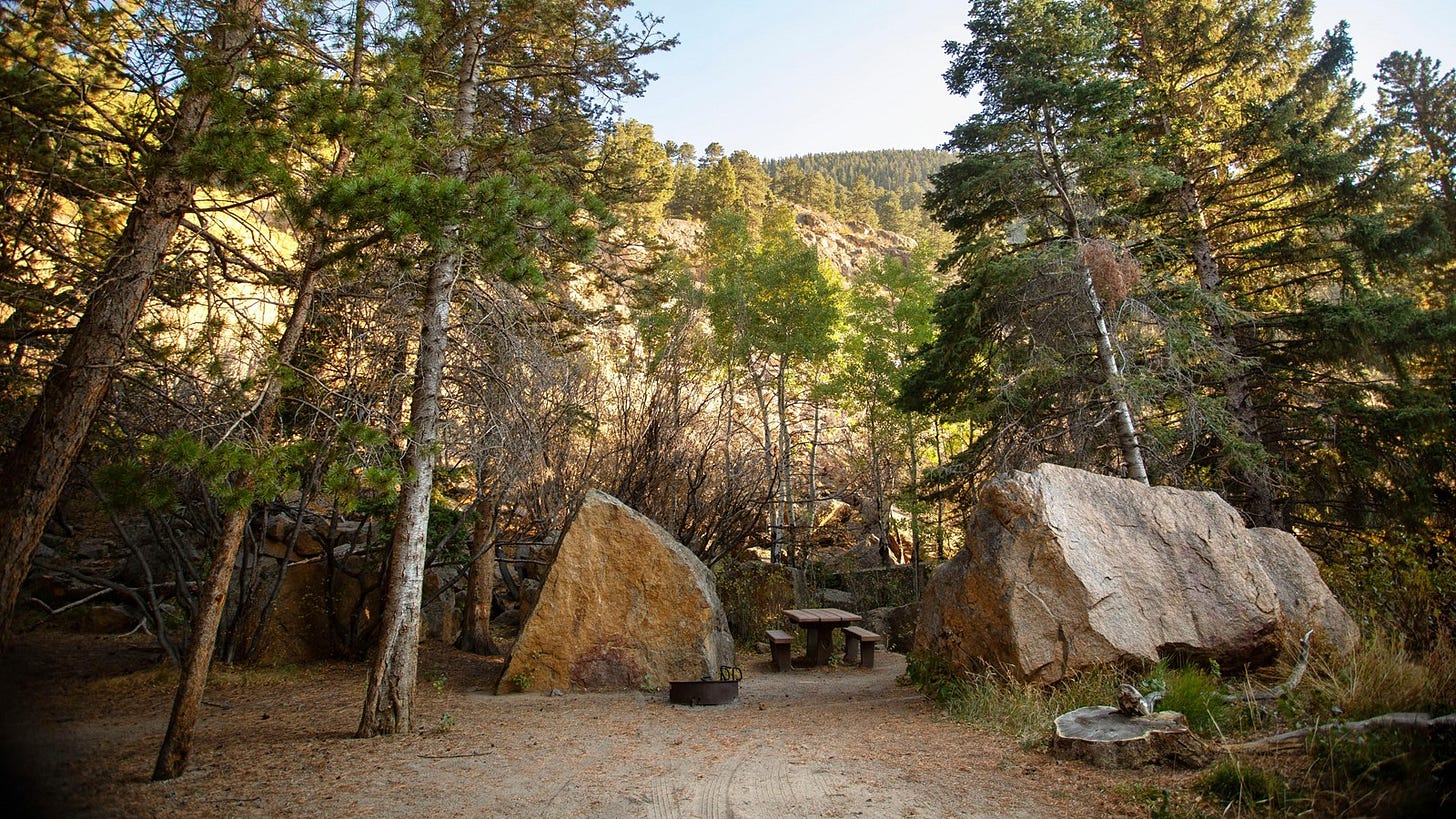
Endovalley Day Use Area, Rocky Mountain National Park
We finally found a place right next to the river and unrolled our bags and put up our tents. Water gurgled over smooth rocks close by where I intended to lay my head that night. In less than an hour, a motorcyclist with loaded saddle bags stopped next to our location and I was worried he might be starting his Harley multiple times during our stay and disturbing the peace in the little box canyon. Instead, he offered us food.
“You guys want steaks for dinner tonight?” he asked, abruptly when his engine went quiet.
“Sure, you got some in your backpack?” Butch sounded sarcastic.
“No, but I have three of them here in my riding pants.” The cyclist stood up and pulled three packaged steaks from the front of his pants and held them up for scrutiny. “I barely have enough money for gas, so I’ve started shoplifting. Getting pretty good at it.”
My stomach did not seem to care about the origin of that meat. Cool shadows had already come over the campsite and the cyclist, who said his name was Bob, quickly built a fire and the smell from sizzling steaks was almost stupefying. He said he was in his third year at Harvard and the pre-law courses in which he had enrolled no longer were of interest.
“Everything’s more interesting than the law,” he said.
“Doesn’t seem to be of any value to me,” Butch said. “Only gets enforced when they want to screw over the little guy for selling a few buds of weed or doing something to take care of his family.”
“Exactly!”
Bob and Butch appeared as brothers from the same lineage. Their faces were covered with untrimmed beards and long, clumps of hair hung wildly around their ears and neck. Dark eyes were hidden deep into bony sockets and their long limbs made them look energetic and animated. Bob was more handsome than Butch, though, with a straight jawline, erect posture, and squared shoulders. His eyes were lively and inquisitive, and Butch’s had been made dull by combat and a difficult childhood.
While we ate our gristly steaks with pocketknives, a woman with three small children approached along the riverbank. She was looking for a campsite and stopped less than fifty feet from our tents. Smiling, she looked our way and asked if we minded her setting up camp with her children that close to our spot. We did not, of course, partly because she was beautiful and because she had seemingly materialized out of the ether with her children and backpacks and camping gear. Bob hurried to her assistance.
“Where did you come from?” I heard him ask.
“We were in Hays, Kansas this morning,” she said. “We got a good ride right to the entrance to this park.”
“You got a ride? Wait. You hitchhiked here from Kansas?” Bob turned to look back at her in astonishment as he slid her tent poles together.
“Yeah, me and the kids. There are some friendly people in this country.”
“But some crazy ones, too,” Bob said. “Aren’t you afraid for yourself and your kids?”
“Oh no, we’ve been all over the country the entire summer. We go from national park to national park. We’re heading down to the Grand Canyon next.”
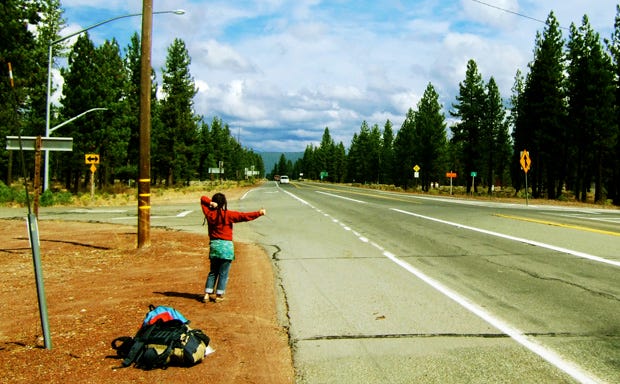
California Dreamin’
Bob started hammering down her tent stakes with a flat rock and the three children watched. The boy, who was oldest, might have been ten. The two little girls were maybe seven and five years old. Their clothes were clean, and they were dressed for travel and adventure with shorts and soft shoes and loose shirts, and their hair was neatly trimmed.
“I don’t understand,” Bob said. “Why are you traveling alone like this?”
“Oh, it’s a divorce. I got custody of the kids and didn’t want to be around my ex because he was kind of violent, ya know? He sends my child support and alimony to general delivery addresses at the national parks we are visiting. It works out just fine.”
Butch looked at me and shook his head, I think in disgust. I had never heard of a woman with children hitching, and in the early seventies it seemed like half the country was standing with a thumb out by the side of the road. In Big Spring, Nebraska, the bridge over Interstate 80 and the westbound entrance ramp were lined with people holding up signs declaring their destinations. These were mostly young men, but a few were traveling with girls. I never saw any children on the road and was skeptical of our tent neighbor’s story.
When the darkness came up the canyon and temperatures dropped, she drifted over to our fire with the kids silently following toward the flame. Motorcycle Bob asked her name, which she said was Melissa, and she introduced her little ones, but I do not recall them because the boy reached into his pocket and pulled out what appeared to be a marijuana joint.
“Here, Mama,” he said. “We can light it with the fire.”
“Well, I don’t wanna burn it all up, Joshua,” she said. “You have to be careful.”
She picked up a smoldering stick of wood and used the glowing end to light the joint and drew deeply before a loud exhale. She handed it back to her ten-year-old son, who smiled, pinched the end, and drew smoke into his lungs. I think Butch, Bob, and I were too stunned to speak a word of protest but did not know if it was any of our business. When the boy passed the glowing cigarette to the middle child, a girl we had concluded was not more than six or seven, Butch spoke up.
“Really?”
“What?” Melissa had no idea what had prompted Butch’s comment.
“What is she, like seven?” he asked.
“Almost. Why?”
“Maybe because she’s too young to smoke pot?”
“Oh, don’t worry about that. She really likes it. Makes her feel good and she never coughs.”
The girl clearly knew how to handle a joint, and almost as quickly as she exhaled her eyes took on a dreamy glaze.
“Mama? Can I?” She was offering the joint to the youngest, who looked at her mother, eager, almost imploring.
“No, I said, not yet. Baby’s still too young.”
The girl passed the pot to Butch, and he immediately put it to his mouth and drew so deeply I began to think he might pass out. Motorcycle Bob grabbed it and kept his hand curled around the fire like it was a precious thing and took two drags before passing it back to Melissa. A second joint was rolled from a bag of weed in her purse and in fifteen minutes everyone was stoned and staring at the fire except for the five-year-old and me. Smoke of any kind made me gag and I did not even try to inhale the pot.
“Does your ex know his kids get to smoke pot?” Butch asked.
“There’s no need to be judgmental about it,” Melissa said. “People don’t understand cannabis. It’s beneficial to our health. Look at my children. Don’t you think they’re healthy and beautiful?”
Her son, Joshua, was staring at the fire with such an intensity he had lowered his face close enough to burn his eyebrows.
“Oh, Josh there looks a bit more stoned than healthy,” Bob said.
She stood and her legs were long in the firelight and her face disappeared into the darkness above where we sat. Her eyes looked green when she was near the flame and her nose was small and straight like her two daughters. Bob got up quickly and offered to help them back to their tent. Butch was stoned and did not want to talk, and I moved closer to the fire pit because I felt the cool air tumbling down from the surrounding mountains.
I lay awake for a long time and listened for Bob to walk past my tent to where his was pitched but I heard nothing until the sound of his motorcycle starting awakened me in the pre-dawn darkness. I thought maybe he was going for food, and I went back to sleep and waited for the sun to come up and make things warm. When I crawled out a few hours later, Butch was sitting on a rock eating a candy bar and there was no trace of Bob or Melissa and her children.
“You dreamed it all,” Butch said when he looked up at my confused expression.
“What the hell, man?”
“Don’t know.”
“Well, they didn’t all leave on his motorcycle.”
“Nope.”
“So, while it’s still dark, Melissa and her kids very quietly take down their tent and walk down to Trail Ridge Road and get a ride over the divide?”
“Sounds feasible.”
“And Bob makes a point of being stealthy until he starts the Harley, but rolls off down the valley, too?”
“No other explanation.”
“Weird. Weird as hell.”
“Who cares?” Butch smiled. “But something good happened while you were asleep?”
“Yeah, what?”
“A guy came by with some dried peyote with mescaline dust all over it.”
“The cactus? That stuff that makes you hallucinate, like LSD?”
“Depends on how much you eat.”
“Not interested,” I said. “No need to hallucinate when you are surrounded by this kind of beauty, buddy boy.”
Butch ignored me, unfolded the blade from his pocketknife, and cut a small corner off what looked like a chocolate bar.
“Just swallow this. You won’t regret it.”
“Not happenin’, Butch.”
“You owe me. Who the hell else could you have gotten to come on a trip like this with you, sleeping in the damn rain and wondering where we are gonna get our next meal? Besides, I don’t want to do it alone. We didn’t have this shit in ‘Nam.”
“I’m afraid,” I said.
“That’s stupid. Here.”
He handed me a corner cut off the peyote and I looked at it for a long time in the palm of my hand. In college, I had judiciously avoided LSD, fearful of any genetic effects or having a trip that was profoundly disturbing. Butch used guilt to convince me mescaline was not like that, and we would not lose touch with reality.
I did not, but I waded out into the river and sat on an island made by a giant tree. My back was against the trunk, and I watched the water coming down from the snowpack on the mountain, convinced I was able to see each drop of water as it formed and gathered with others to enter the stream. Butch said I was almost motionless for about three hours until I pointed at a talus slide of gravel and boulders that went up over a ridge and disappeared.
“Let’s climb up that,” I said.
“Okay. I don’t care.”
I did not know what was happening to Butch, but we crossed the river and started up a difficult climb wearing shorts and tennis shoes. Difficulty increased the higher we climbed, and the loose talus disappeared, and we were forced to make our way up a steep field of slick boulders. I considered turning back but going down looked frightening with the sharp grade and loose footing.
Our knuckles and knees were bloody when we reached the top of the escarpment, but I remember looking at the trickles of red down my arms and legs and being surprised that I felt nothing. Butch came up behind me and we tried to see back down to Endovalley but must have been disoriented because the campground was not visible. We turned around and saw a beautiful meadow of flowers and scattered Ponderosa pines.
“Oh, wow, man,” Butch said, a bit hypnotically. “Do you think we are the first white people to ever see this place?”
“My god, I’ve never seen a spot this beautiful.”
Not too far beyond where we stood, the snow-capped crests of the Never Summer Mountains cut a jagged edge across the western horizon, and we saw a river marking wormy turns in a distant valley. We started walking west with no idea where we were going or how we might make it back to our tents before nightfall.
“Oh, shit,” Butch said. “Look at this shit. Damnit!”
I walked over to where he was nudging something on the ground with his foot, thinking, perhaps, he had come across a dead forest creature.
“Ha, that’s too funny,” I said. “Not exactly the first white people, eh?”
Butch was forlornly looking down at a six-pack of empty brown Budweiser bottles and a few Snickers wrappers. Not the detritus of indigenous peoples or brave pioneers. He heard something, a hissing sound, he said, which I did not hear.
“It’s over this way. Come on. Probably a waterfall.”
“That would be great to see.”
I followed and the sound got louder as a light rain began falling. The woods grew thicker, and we picked our way through trees and underbrush. We came upon a tangle of brush that had obscured our view of the mountains and emerged on the other side next to the shoulder of a highway.
“Oh, fukk. It’s traffic. Not a waterfall.” Butch was deflated.
“Maybe,” I said, “We’re the first white people to see this highway.”
“Fuck off, pal.”
“It’s Trail Ridge Road, I’m pretty sure,” I said. “Goes over the Great Divide. I think it might be the highest elevated pavement in the country. I read about it. Twelve thousand feet above sea level.”
“Son of a bitch.”
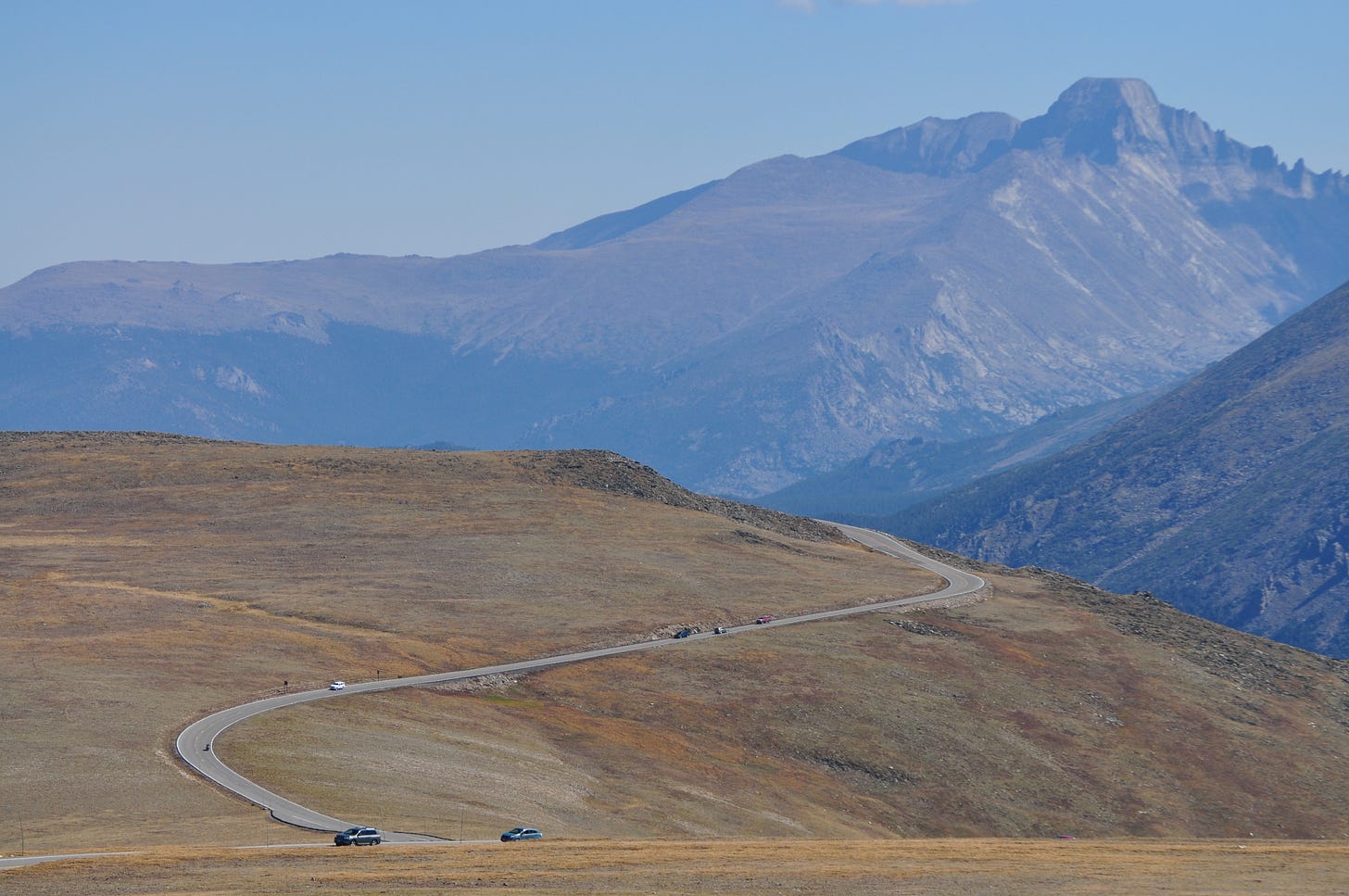
Trail Ridge Road
The rain came harder, and we were helplessly soaked. I moved around to keep warm, and Butch sat in a ditch and watched the traffic pass. If the peyote affected me, it must have been as I watched the water pass in the river. My friend Butch, though, seemed transfixed by every atom in existence. I was, I thought, finishing up what might be called a “bum trip” after the beer bottles and candy wrappers.
The clouds were breaking up on the Never Summer Mountains, but Butch sat motionless with water rising around him in the culvert, wet, cold, and shivering. He must have looked pitiful or haunted or frightened because a ranger stopped his truck to ask if anything was wrong. I came out of the tree line and explained our adventure, minus the psychotropic additive, and the ranger laughed before inviting us into his truck and out of the rain for a quick ride back down to the campground.
* * *
Butch and I made it across the Great Divide a few days later and spent the summer wandering the West through Utah and California and Arizona and New Mexico. In a few years, I was working at a radio station out on the Eastern High Plains of Colorado. The manager loaned me $500 to buy a car and all I was able to afford was an old Opal Kadett. On my days off, I drove west on Interstate 70 as far as I needed to be able to see the Rockies.
Usually, when there were no clouds and the air was clear, I saw them from the parking lot of a convenience store in Limon. My favorite pastime was to buy a quart bottle of beer, sit on the hood of my little car, and dream of unexplored trails and new adventures up above the timberline. When I was young, mountains made me happy just to be alive.
Hell, they still do.